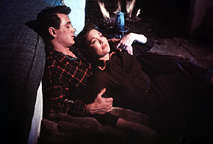
All That Heaven Allows (1955)

All That Heaven Allows is a classic Douglas Sirk melodrama with Jane Wyman and Rock Hudson, that was the inspiration for Rainer Werner Fassbinder's Ali, Fear Eats the Soul (1973). After the death of her husband, New Englander Cary Scott (Jane Wyman) settles into the role of being a lonely, middle-aged widow, and her friend Sara (Agnes Moorehead) tries to get her back into the social scene. Harvey (Conrad Nagel), an elderly family friend, proposes to her, but she turns him down. Cary becomes friendly with her young gardener Ron Kirby (Rock Hudson), and despite their age difference, they fall in love and Ron asks her to marry him. Cary's grown children, Ned (William Reynolds) and Kay (Gloria Talbott), come home for a visit, and they're shocked to learn that she's planning to marry Ron, since he's much younger and from a different social class, and that she intends to move out of the family home. Cary takes Ron to a party to introduce him to her friends, but they're subjected to insults and mockery. In the 1950s, Douglas Sirk was Universal's house director, turning out a succession of slick, commercially successful soap operas with producer Ross Hunter. On the surface, like most of Sirk's Universal tearjerkers, All That Heaven Allows is a combination of "kitsch, craziness," and trashiness," to use the director's own words, yet, as always, he transforms the wish-fulfillment fantasy cliches into a poignant love story and incisive social critique through his masterful handling of actors and his transcendent mise-en-scene. Sirk draws a superb performance from Wyman, using composition and expressionistic colors to trap her in private, middle-classic prison, framed behind picturesque snow-covered windows, her sad image reflected in objects such as mirrors, furniture, and a television set, creating a pathetic imitation of life. Russell Metty's cinematography brilliantly serves Sirk's style of long takes, reframing the characters through subtle camera movements, and splitting the frame into sections while bathing the foreground and background of a shot with different colors to suggest the emotional state of the characters. A particularly stunning example is when Kay comes home in hysterics after her friends were teasing her about her mother getting married, and the multi-hued glass of a circular window throws a rainbow-pattern across her face as she's crying. With its touching story and stylized treatment, All That Heaven Allows is one of Sirk's finest films.
CAST
Performer/Character
Jane Wyman, Cary Scott
Rock Hudson, Ron Kirby
Agnes Moorehead, Sara Warren
Conrad Nagel, Harvey
Virginia Grey, Alida Anderson
Gloria Talbott, Kay Scott
William Reynolds, Ned Scott
Jacqueline de Wit, Mona Plash
Charles Drake, Mick Anderson
Hayden Roarke, Dr. Hennessy
Leigh Snowden, Jo-Ann Donald
Curtis Howard, Hoffer Ale
Gerry George, Warren
Merry Anders, Mary Ann Nestor
David Janssen, Freddie
Production
Producer, Ross Hunter
Director, Douglas Sirk
Screenwriter, Peg Fenwick (based on a story by Edna L. Lee and Harry Lee)
Cinematographer, Russell Metty
Editosr, Frank Gross and Fred Baratta
Music, Frank Skinner and Joseph Gershenson